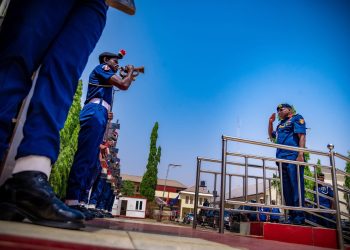By Nkechi Eze
The National Counter Terrorism Centre (NCTC), under the Office of the National Security Adviser (ONSA), on Friday, November 7, 2025, hosted African Union (AU) Ambassadors and security experts in Abuja in what was described as a historic reaffirmation of Africa’s collective resolve to defeat terrorism through home-grown, united, and intelligence-driven strategies.
The high-level delegation, led by the AU Commissioner for Political Affairs, Peace and Security, Ambassador Bankole Adeoye, visited the Centre as part of the African Union Sub-Committee on Peace and Security Capacity Building Workshop, held earlier in the week. The visit showcased Nigeria’s growing leadership in regional security coordination and its deepening partnership with the African Union in the fight against terrorism and violent extremism across the continent.
In his welcome remarks, the National Coordinator of the NCTC, Major General Adamu Laka, who represented the National Security Adviser, Mallam Nuhu Ribadu, mni, described the visit as a profound milestone in Nigeria’s ongoing efforts to strengthen regional cooperation and intelligence synergy against terrorism.
“It gives me great joy and a deep sense of duty to welcome you to the National Counter Terrorism Centre,” Major General Laka said, extending appreciation to Ambassador Adeoye for his exemplary leadership and foresight in steering the AU Peace and Security Sub-Committee. “This visit is especially significant as it affords us the opportunity to share the progress Nigeria has made in strengthening counterterrorism coordination and deepening regional partnerships through this Centre,” he stated.
He explained that the NCTC, established under the Terrorism Prevention and Prohibition Act 2022, serves as the lead coordinating body for all counterterrorism and terrorism financing efforts in Nigeria, bringing together the collective resources, intelligence, and expertise of relevant Ministries, Departments, and Agencies.
Highlighting Nigeria’s “whole-of-government and whole-of-society” approach to countering violent extremism, General Laka noted that the NCTC engages communities, traditional and religious leaders, academia, civil society, and the private sector in building resilience against radicalisation. He also reaffirmed that Nigeria’s Policy Framework and National Action Plan for Preventing and Countering Violent Extremism is currently under review to enhance its impact.
“Our facilities, including state-of-the-art forensic and DNA laboratories, cyber intelligence and data analysis platforms, and advanced command and coordination systems, provide the technical backbone for modern counterterrorism operations in Nigeria,” he said.
The NCTC Coordinator recalled the milestone achieved during the April 2024 Africa Counter Terrorism Summit in Abuja, which culminated in the Abuja Declaration, a resolution that recognised the NCTC as a Regional Centre of Excellence for Counterterrorism in West Africa and the Sahel.
Building on that recognition, he revealed that in September 2025, the NCTC and the AU Commission signed a landmark Memorandum of Understanding (MoU) to enhance cooperation on training, intelligence sharing, joint research, and expertise exchange. “This partnership underscores our shared belief that African challenges demand African-led solutions,” he asserted.
General Laka also commended Nigeria’s steady progress in institutionalising justice and accountability under the leadership of the National Security Adviser, Mallam Nuhu Ribadu, disclosing that 775 convictions have been secured in terrorism-related trials across eight phases, an achievement he described as “a testament to Nigeria’s commitment to the rule of law and the fight against impunity.”
Looking ahead, he announced that the NCTC will soon launch its Strategic Plan 2025–2030, as well as unveil a revised National Counter Terrorism Strategy and updated National Action Plan for Preventing and Countering Violent Extremism before the end of the year, setting a new direction for counterterrorism coordination and regional engagement.
“The NCTC remains open to all African Union Member States. Our training programmes, technical facilities, and knowledge resources are available for collaboration and partnership,” he said. “This will sustain the cooperation, intelligence sharing, and mutual trust we require to build a safer and more resilient Africa.”
In his response, Ambassador Bankole Adeoye commended Nigeria’s leadership and the NCTC’s exemplary work in advancing Africa’s counterterrorism architecture. He noted that the visit had provided valuable lessons that would shape the operational framework of the AU’s own Counterterrorism Centre.
“Our mission here is to learn, to share experiences, and to draw lessons from Nigeria’s counterterrorism efforts,” Ambassador Adeoye said. “These insights will inform the work of our own African Union Counterterrorism Centre as we seek to enhance intelligence sharing and strengthen collaboration among all stakeholders through a whole-of-government and whole-of-society approach.”
The AU Commissioner praised Nigeria’s commitment to regional peace and security, expressing optimism that the NCTC would evolve into a Continental Centre of Excellence under the African Union’s auspices. “Our goal is to see this Centre work across all five regions of Africa to ensure that the forces of terror never undermine our sovereignty,” he said.
Ambassador Adeoye, who toured the NCTC’s facilities, including its cutting-edge forensic laboratories, lauded the professionalism and dedication of the Centre’s personnel. “Terrorists cannot and will not take over our continent. We cannot afford to yield even an inch of space to them,” he declared emphatically.
He underscored that Africa’s defense must be anchored on the African Common Defence and Security Policy, built on the principles of unity, collective responsibility, and protection of the people. He stressed that terrorism undermines the African Union’s Agenda 2063, which envisions a peaceful, prosperous, and integrated Africa.
“I commend the Office of the National Security Adviser and the National Counter Terrorism Centre for your partnership with the African Union. This fight is not for one nation alone—it is a collective African struggle,” Ambassador Adeoye reaffirmed.
He further disclosed that the African Standby Force is being operationalised to support counterterrorism efforts at regional levels, while lesson-learning sessions will continue to draw insights for strengthening Africa’s security and peace enforcement frameworks.
“Until every inch of African soil is secure, we must remain steadfast in confronting the forces that threaten our peace and development,” Ambassador Adeoye concluded.
The visit, which brought together AU Ambassadors, security experts, and senior Nigerian officials, underscored Nigeria’s central role in shaping Africa’s counterterrorism architecture and reaffirmed the shared continental vision of defeating extremism through solidarity, innovation, and cooperation.
















